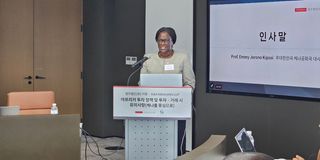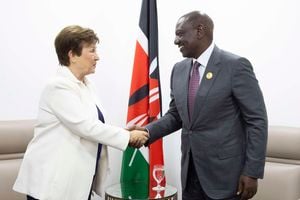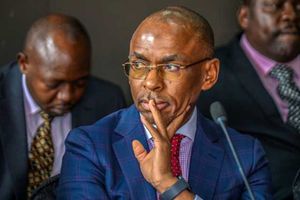Kenya woos investors ahead of Korea-Africa summit

The Kenyan Ambassador to Korea Prof Emmy Kipsoi addresses investors in Seoul on May 23 during a pre-summit conference for the upcoming Korea-Africa Summit.
Preparations for the inaugural Korea-Africa Summit scheduled to take place on June 4 and 5, 2024 are in top gear. The Summit seeks to establish a new cooperation framework, which will pave the way for Korea to invest in Africa.
Kenya has jumped ahead in the scramble for Korean investors by marketing itself as a top investment destination at a pre-summit conference in Seoul two weeks before the Korea-Africa Summit.
The country will pursue Trade and Investment Promotion Frameworks (TIPFs), Economic Partnership Agreements (EPAs), and other agreements with African countries to expand economic cooperation and establish a foundation for trade collaboration.
It will offer Korean investors the opportunity to explore market entry strategies into Africa and enhance their understanding of cooperation measures, particularly in light of the full implementation of the African Continental Free Trade Area (AfCFTA) agreement.
54 African countries
Leaders from all the 54 African countries are expected to attend the Summit that will enhance trade between Korea and Africa which currently accounts for only three percent of Korean exports and 1 percent of imports.
The East Asian nation is exploring areas of cooperation with African countries across all sectors, including infrastructure, agriculture, healthcare, technology, energy and social development.
Kenya is, however, not waiting for the Summit and has started wooing Korean investors on its own.
Kenya’s ambassador to Korea Prof. Emmy Kipsoi told an investment conference on Friday that Nairobi is open for business.
“We are the most stable democracy in East Africa founded on the rule of law which provides a predictable and safe environment for investments,” said the ambassador.
“On a pure dollar basis, Kenya receives more venture capital than any other country on the continent, dramatically outperforming other leading countries, including Nigeria, Egypt, and South Africa, when scaled to their respective gross domestic products.”
The pre-summit conference which showcased Kenya’s potential to Korean investors was organised by Seoul law firm Jipyong LLC and Nairobi-based legal firm G&A Advocates LLP.
The two law firms entered into a collaboration arrangement in April in order to support Korean companies interested in entering the African market. Additionally, the partnership will provide support for African companies seeking to do business in South Korea and in the larger Asian region.
"Kenya has a raft of investment promotion laws with attractive features such as fiscal and non-fiscal benefits, multiple dispute resolution mechanisms including specialised dispute bodies, and policy fostering an open economy and trade liberalization,” G&A’s partner and Head of Corporate, Commercial Sylvia Kithinji told Korean investors at the seminar in Seoul.
“Necessary protections exist in law and select bilateral agreements to safeguard against key threats to investment such as expropriation, double taxation, monopolies, infringement of intellectual property rights.”
Jiopyong LLC which used the event to ramp up support for Kenya as an investment hub for Korean investors said Nairobi has made concerted trade and investment policies which makes it attractive.
“The government’s medium-term economic growth plan focused on spurring industrialisation has driven demand for infrastructure and offered a strong foundation for the emergence of promising sectors including construction, manufacturing, healthcare and green energy,” said Min Chung, Jipyong’s Group Leader of Business Intelligence.
Kenya is already a hub for several Korean companies like Samsung Electronics, Hyundai, Daewoo and Korea Telecom. Nairobi, however, wants to use the summit to ramp up more foreign direct investments from Seoul.
Kenya’s main exports to Korea include coffee, titanium ore, and scrap copper among others. Kenya imports include iron and steel, organic chemicals, machinery, nuclear reactors, boilers, and manmade staple fibres, among others.
Kenya and South Korea have enjoyed strong bilateral ties over the years, especially on trade. According to the Kenya Economic Survey 2023, the value of imports from South Korea increased from Sh22.3 billion in 2021 to Sh50.2 billion in 2022, mainly due to increased imports of kerosene-type jet fuel. Exports equally increased to Sh6.1 billion, from Sh3.9 billion.
Last year, the two countries pledged to continue to nurture and expand ties aimed at contributing to socio-economic development through the creation of a free trade agreement.




